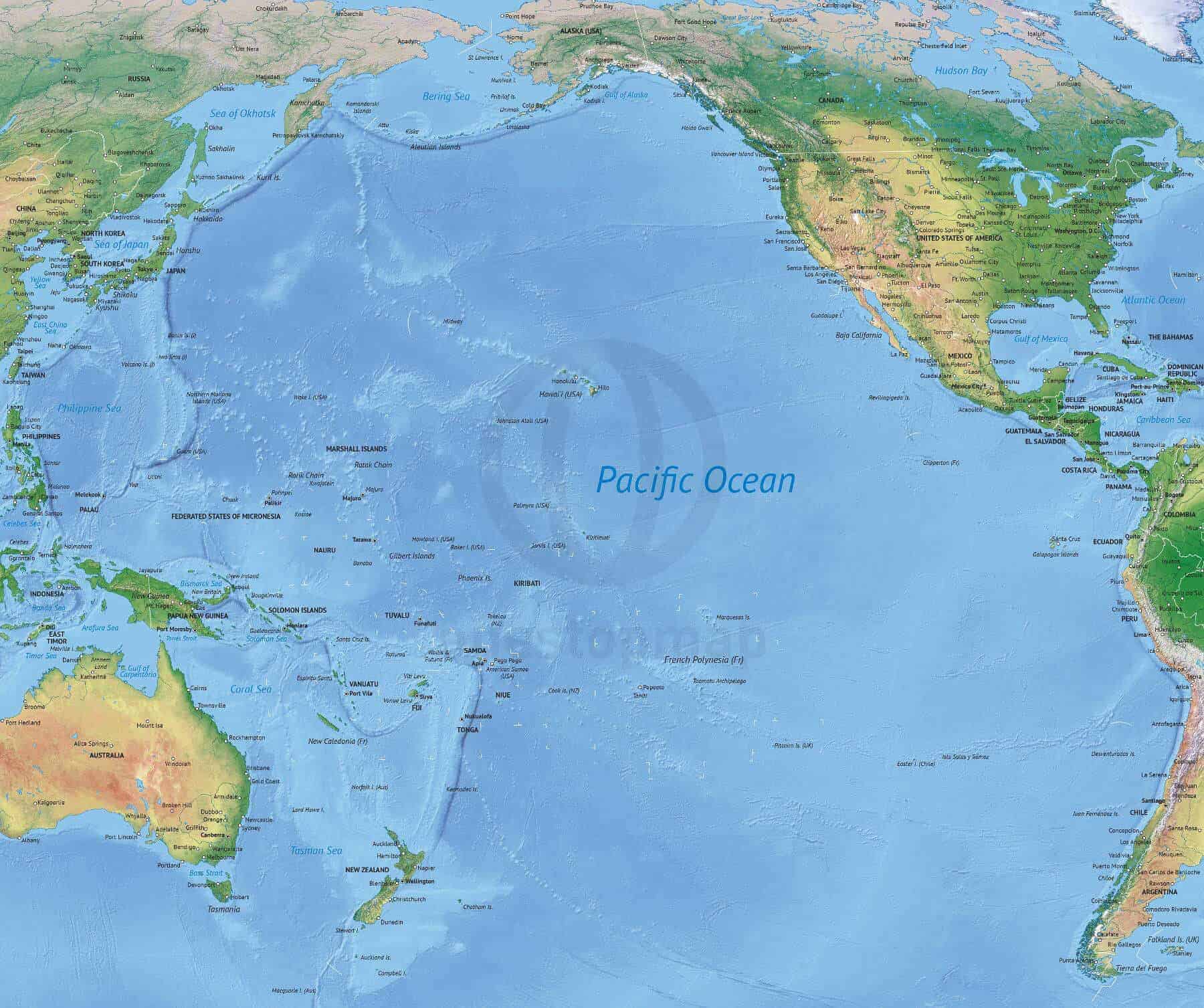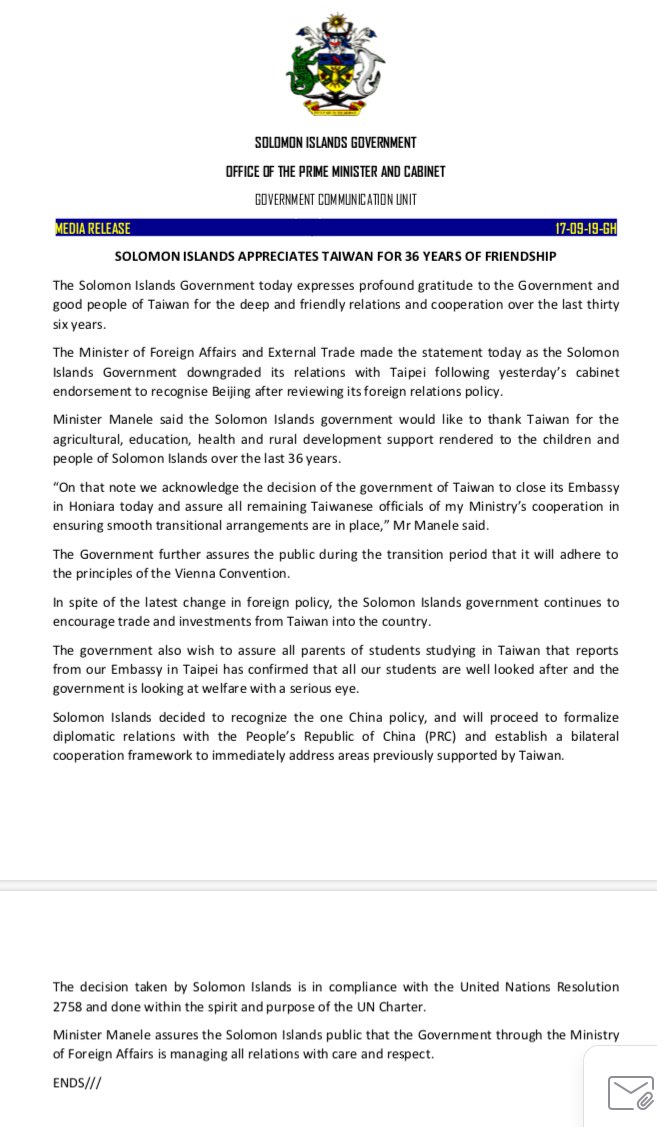Rethinking international trade and the look north policy
The look north policy approach has been a controversial foreign policy approach taken by developing countries in the Pacific region. The usage of the phrase 'look north' is metaphorically used in reference to China. Geographically, China is not directly to the north of both PNG and Fiji, it is towards the north-west.
The rapid transformation that started in the 1980s and continued to today was and is the main reason why countries in the Pacific have decided to look north. In particular, countries are interested in learning about the Chinese model of development and want to strategically position themselves in order to benefit from the growth of the country.
The latest country to follow the look north policy direction is the Solomon Islands. The Solomon Islands cabinet has decided to adhere to the 'One China' policy in a major foreign policy shift after 36 years. They now view Taiwan as an integral part of the Chinese mainland and not as an independent country. This will make it possible for them to be a part of the One Belt One Road Initiative.
PNG's diplomatic relations with China goes back to 1976. The relationship was possible via the 'Friends to All and Enemies to None' foreign policy approach. PNG as a democratic country was able to foster a cordial relations with communist China. Our relations was not affected by the ideological divide.
In 1994, when Paias Wingti was Prime Minister, he announced the look north policy. The original intention of the policy was to reduce national dependence on Australia as mentioned by Mitna (2018). PNG wanted to diversify and strengthen its relations with China and other Asian countries.
Mitna (ibid.) also confirmed the fact that Wingti's foreign policy shift was driven by the growing influence of Asian countries, especially China. During that period, China was emerging as a powerful nation, or deemed a rising power. He saw China as an alternative development partner who offered economic opportunities. He talked about the need for PNG to focus on trade and investments.
A very important observation made by Mitna (ibid.) using the levels of foreign policy making explained by Gyngell and Wesley (2003) was Wingti's inability to communicate the look north policy to the bureaucracy at the organisational level. Mitna (2018) stated in page 60 that:
"...the policy was suggested at the political level, but was not developed by the bureaucratic mechanism. As a result, the essence of this policy proposal was not adequately translated into practical policy. For example, the policy focused on Asia, but it was difficult to determine who was authorised to make decisions with who, for what purposes, on what issues, how these decision would translate into tangible outcomes and whether these decisions were aligned with the country's interest. In effect, there was never a clearly enunciated statement for what the look north policy was..."
This is similar to the current 'Food Basket' vision proclaimed by Jame Marape. At the strategic level, Marape has made a general policy statement in his prime ministerial speeches that he would like to look towards Southeast Asia. He believes PNG as a food basket can supply Southeast Asian countries with organically grown vegetables and other agricultural produce.
Gyngell and Wesley (2003) in page 25 stated that:
"....strategic policy statements self-consciously try to be logically and rhetorically accountable to broad conceptions of the public interest and national values, and general enough to be applied and interpreted variously. They attempt to reconcile past policy, current dispositions and future actions, while allowing some differentiation between successive administrations' policies..."
The challenge now is to structure political and bureaucratic resources towards achieving the 'Food Basket' vision and the foreign policy shift to Southeast Asia. As mentioned in my previous article titled 'Marape's Food Basket Diplomacy', a specific written policy approach is needed. We have to learn from the mistakes we made during the Wingti era or the 'lost decade of the 1990s' as outlined by Mitna (2018).
Most importantly, Mitna (ibid.) said PNG did benefit from the look north policy. He said in page 61:
"...The look north policy strengthened PNG's existing relations with the wider Asian countries, in that it gave greater leeway to Asian businesses and state-owned enterprises to exploit PNG's resources. In turn, it generated economic opportunities for PNG, most notable the increase aid and investments from China..."
The theory of liberalism especially the sub-theory of commercial liberalism can be used to explain the look north policy. Commercial liberalism talks about free trade between states or trade liberalization. An increase level of economic interdependence will decrease the likelihood of going to war, but most importantly, contribute to the economic development of a developing country like PNG.
Mitna (ibid.) showed that Wingti did talk about trade but his government's inability to formulate a coherent trade policy resulted in the development of ad hoc and often conflicting rules, regulations and practices affecting trade. In addition, there was even a greater disconnect between trade policy framework and other key economic, sectoral and social policy issues.
The country needs to do more research into the area of international trade in order to formulate coherent policies that will maximize our national interest. In particular, we need to focus on understanding the Chinese trading system and network to make sure we benefit fully from the One Belt One Road Initiative. Otherwise, we will continue with the trend of policy misalignment and fail to capitalize on the Asian century.
References
Gyngell,
A., & Wesley, M. (2003). Making Australian foreign policy. New York: Cambridge
University Press.
Mitna, P (2018). Factors influencing Papua New Guinea’s foreign policy in the Twenty-First Century (Doctoral dissertation, The Australian National University). Retrieved from https://openresearch-repository.anu.edu.au/handle/1885/156980?mode=full
Mitna, P (2018). Factors influencing Papua New Guinea’s foreign policy in the Twenty-First Century (Doctoral dissertation, The Australian National University). Retrieved from https://openresearch-repository.anu.edu.au/handle/1885/156980?mode=full



This comment has been removed by the author.
ReplyDeleteVery nice piece. I captured some insights about Look North Policy. Thank you, Mr. Yegiora
ReplyDelete